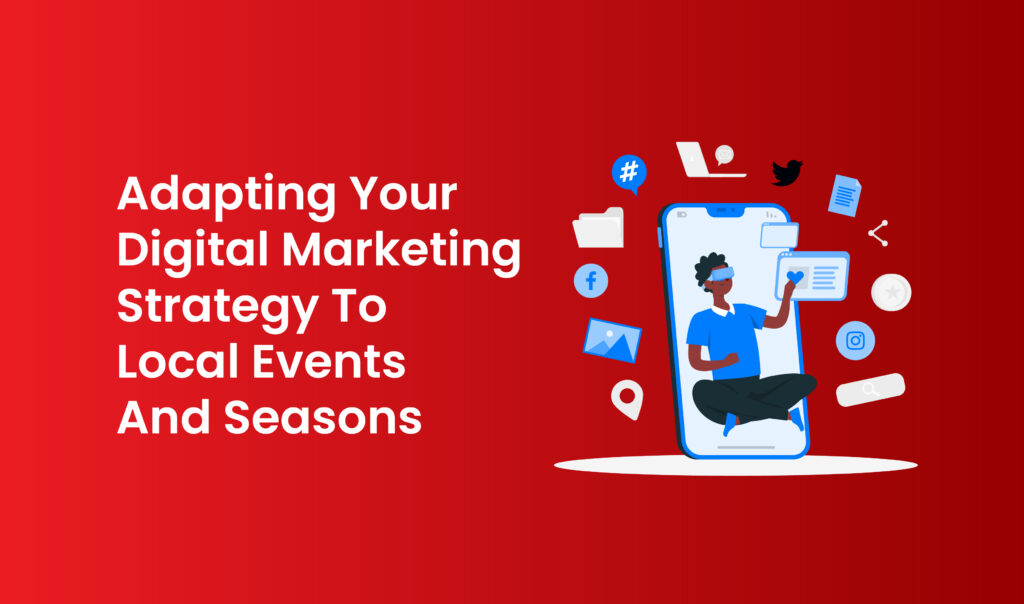Have you recognized the challenge of maintaining relevance amidst intense competition from numerous companies? In order to remain pertinent and captivate your target demographic, incorporating certain tactics into your marketing strategies is crucial. This entails tailoring your digital marketing approach to coincide with local events and seasons. Today, you’ll discover the importance of adjusting your digital marketing strategy to align with local events and seasons.
The Importance of Adjusting Your Marketing Strategy to Local Events and Seasons
Why is integrating your marketing strategy with local events and seasons crucial? It’s akin to customizing your message to resonate with the atmosphere of your community, and it’s essential because it enables your local business to share valuable, informative, or promotional content. By aligning your content with local events or seasons, you demonstrate professionalism to Google, indicating that your online visibility is a priority.
Similarly, think of it as conversing with your neighbors; you aim to be friendly and supportive. Well, Google appreciates that too! When you discuss local events or relate to the current season, you signal to Google, “Hey, I’m a part of this community.” And in return, Google rewards this by elevating your business in search engine results pages.

Google also takes into account your location and the preferences of people in your vicinity. This is because Google aims to present your business to the most relevant audience. So, when you tailor your content to local occurrences or the time of year, you’re effectively promoting your business to the appropriate audience at the opportune moment. But that’s not all!
Just like recommending a nearby restaurant, adapting your marketing to local factors isn’t just about maintaining a positive online presence; it’s also about being as helpful as a local friend. Aligning your digital marketing strategy with local events and seasons aids your business in reaching the right individuals at the right time, ultimately resulting in increased traffic, clicks, and conversions.
The Significance of Seasons
- Seasons inherently shape consumer behavior.
- They dictate shopping patterns, product demand, and service requirements.
- For example, a local ice cream parlor can anticipate heightened sales during the warmer summer months; a landscaping business may observe an uptick in inquiries as spring arrives or summer draws to a close; a tax preparation and accounting firm will witness an influx of clients nearing tax season.
- Time-sensitive promotions during particular seasons instill a feeling of urgency and exclusivity.
Getting Started
- A strategic starting point in crafting a local event or seasonal strategy involves identifying the types of events and occasions that hold the most relevance for both your business and your customer base.
- Reflect on which events or initiatives would deeply resonate with your local audience; seek genuine ways to establish connections with them.
- These events could be organized by your business, a local business partner, or those you endorse or support through community organizations.
Consider various types of events, such as:
Launches of new products or special promotions.
Educational seminars conducted in person or online webinars, tailored to how and where you deliver your services.
Business milestones, like anniversaries or the opening of new locations.
Events to show appreciation for your clients.
Holiday and seasonal events or promotions, like Black Friday or Christmas.
Local charity events.
Events organized by local sports teams or clubs.

Undoubtedly, there are other event categories tailored to your business or the local community, so tap into your creativity to devise something distinctive.
Digital Marketing Strategies for Your Local Business
Developing an effective digital marketing plan for your local business entails exploring various digital marketing methods. These tactics are designed to engage with your community and enhance your online visibility.
Firstly, search engine optimization (SEO) works to ensure your business appears prominently in local search results when nearby individuals search for products or services you offer. Think of it as enhancing your visibility within the online neighborhood.
Next, there’s social media marketing, akin to hosting a virtual community gathering where you showcase your offerings. Utilizing platforms like Facebook or Instagram, you can generate excitement and interact with locals.
Content marketing is another integral component, focusing on crafting valuable and pertinent content that resonates with your community. It’s akin to sharing stories that connect with your neighbors, fostering trust and credibility.
For targeting individuals in close proximity, local SEO is vital. This involves optimizing your online presence to appear in local search queries such as “near me,” ensuring your business is easily found by nearby consumers.
For businesses with physical locations, Google My Business is indispensable. It serves as a digital storefront, facilitating online and offline discovery by placing your business on the local map.
Lastly, email marketing functions as your digital newsletter, enabling you to keep your community informed about promotions, events, or noteworthy updates.
By integrating these digital marketing strategies, you create a comprehensive marketing approach for your local business. The focus lies in engaging with your local audience, enhancing discover ability, and cultivating enduring connections.

Develop Your Content Based on Events
1. Event WebPage Content
Craft compelling event webpage content by adjusting your digital marketing strategy to suit upcoming events.
Additionally, incorporate a dedicated Event page within your About Us section and captivate users with interactive features.
If so, include a link to validate your local connections to search engines. Don’t forget to address frequently asked questions about the events or organizers in your area.
2. Informative Blogs and Articles
In today’s digital landscape, it’s essential for any event or organization to have a social media presence and offer educational or informative content in a creative manner.
Consider developing informative blogs and articles that correspond with the events outlined in your digital marketing strategy or content plan.
This involves covering pertinent topics related to the event and integrating keywords to bolster your search engine visibility.
3. Video Content
Share informative or educational video content across your social media platforms. Tailor your digital marketing strategy to incorporate local events happening in your area.
Go From Beginner to Expert in
Just 8 Months!
With Purdue PG Digital Marketing Program
How can you achieve this?
Highlight event moments, provide behind-the-scenes glimpses, and conduct interviews on your social media channels to maximize online reach.
4. Social Media Content
Ensure alignment with your digital marketing strategy by embedding calls-to-action and event links in all your social media posts.
Additionally, foster a sense of community, encourage user engagement for effective online promotion, and prompt your audience to share your content.
Conclusion
In conclusion, make sure to implement these engaging tips and consistently analyze and monitor your digital marketing strategy’s performance.

